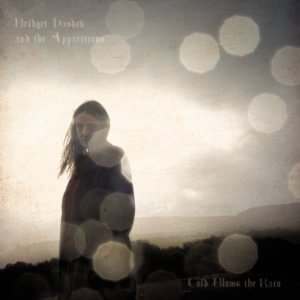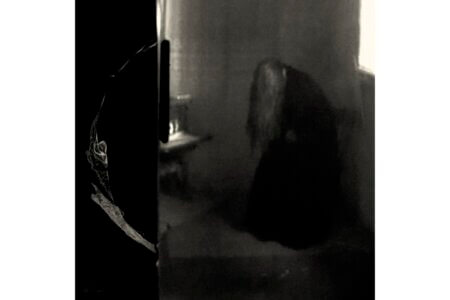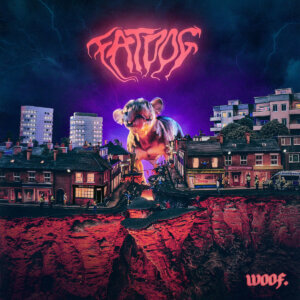
9
DIA
Ela Minus
In Ela Minus’ DIA, destruction is the heart of the record. The Colombian artist’s second album—a massive sonic expansion from her techno-meets-lofi 2020 debut acts of rebellion—transforms the nightclub into a battleground: a place where she can identify and overcome her own weaknesses to change the world around her.
In DIA, destruction is seen as both a tethering and liberating force. It begins with “ABRIR MONTE,” a crispy, rattling ambient track that squelches and pulsates before exploding into a techno space rave. The Spanish phrase the title references translates to “opening” or “splitting mountains,” and this visceral image of cutting through hard rock to create a path to freedom sets up DIA’s primary narrative. The endless night at the club then begins: “BROKEN,” a dizzying, futuristic track shows Minus seemingly directionless. “I’m on my knees / haven’t found a faith / here I am again / bending everything till it breaks,” she sings. Her vocals cry out over the warbling and buzzing of the synths, creating a tone that balances between unabashed fun—letting go of the idea she needs to be “fixed”—and desperation for mental clarity.
Wading through uncertainty until the midway point of the album, Minus embraces a gritty, dark, and edgy sound full of record scratches, static, and cloudy distortion. She continues the narrative of feeling lost and broken with lyrics like, “All it took / was a little blood / to see what I’m really made of / It’s a shame / that it takes pain / to know who we are” (“IDOLS”), and “I don’t know what I’m doing / I feel lost / listening to the voices / echo off the wall.” (“IDK”) While simple in nature, Minus’ lyrics feel earnest, like she’s felt and absorbed every punch to the gut she’s ever received. In these moments, where she trades the light spaciness from “BROKEN” for a heavy, industrial tone, DIA becomes the opposite of an escapist record. Many club albums rely on the themes of escapism, abandoning one’s troubles for a night of indulgence, but Minus’ music argues that struggle is inherent to everyone—a coat one can’t check at the door before entering the dance floor. In DIA, the club isn’t some liminal space outside reality: it’s a box stuffed with complicated people working through their own hardships.
Yet, after “QQQQ,” the fog that traps her into a cycle of self-scrutiny clears, and Minus begins to gain a confident rigor. Minus becomes an agent of destruction: sonically, DIA begins to take on a more ethereal quality, pulling from the cyber/robotic aesthetic of 90s club synth and vaporwave to ascend into space. The upbeat tempo established in the first half remains consistent, like she’s caught a second wind and is forcing herself through the endless night. “ONWARDS” and “UPWARDS” channel their gritty sharpness into energetic calls to action, which is also reflected in the tonal shift of her lyrics. “Today is the first day of my life / I threw the match set it all alight,” she sings in “ONWARDS” before ending the track with, “Come sit, and watch it burn / Hope with flames comes rebirth / but I won’t hold my breath.” Likewise, in “UPWARDS” Minus reflects on the solitude that comes with self-healing, conjuring up a vision of a suffocating hell she has to escape by herself, otherwise she’ll sink with the people ultimately holding her back.
Most of the production on Minus’ record is refined and crystal clear: the seamless transitions from one track to the next preserve the music’s energy, and it allows the artist’s thoughts to flow in a stream of consciousness. It is, however, in the moments of total disruption where Ela Minus’ narrative vision for DIA shines the most. “AND,” a 58-second interlude between “ONWARDS” and “UPWARDS,” cuts the record completely, piercing through with a distorted, harsh ambient loop until shutting off all noise for a brief moment. At first listen, it’s awkward: it doesn’t perfectly bisect DIA, otherwise it’d be earlier in the record. It also stops momentum at a point where an uninterrupted flow between three songs—united in theme, sound, and phrasing (“onwards and upwards”)—makes the most sense. But, its awkwardness attacks the album’s central message: one’s imperfections create shape, texture, and contour. There’s a humanness to “AND” like there’s a humanness to our imperfections, and its presence grounds the record to make a real, honest portrait of life.
Ela Minus’ DIA has heart, grit, and spirit. It’s an almost-spotless record about the endless battle for self-acceptance and self-discovery, contained in ten tracks that guarantee a cathartic night at the club. And though the whole record teems with beautiful production paired with introspective lyrics, perhaps the final track “COMBAT,” a lush finale that aims to burn the whole world down to seek freedom, encapsulates the central message of DIA best: “No parar,” or “keep going.”
Pre-order DIA by Ela Minus HERE
Latest Reviews
Tracks
Related Albums
Related News
Advertisement
Looking for something new to listen to?
Sign up to our all-new newsletter for top-notch reviews, news, videos and playlists.












